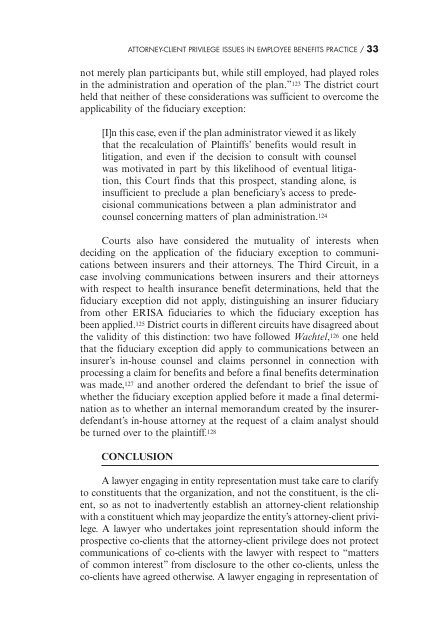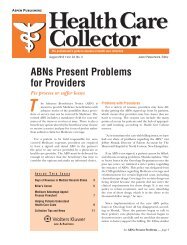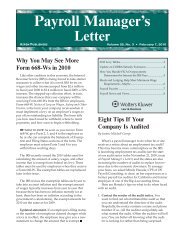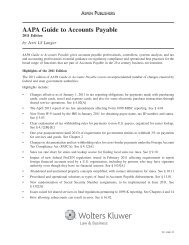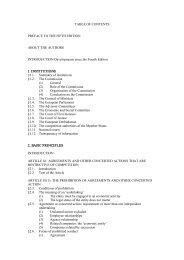journal of pension planning & compliance - Kluwer Law International
journal of pension planning & compliance - Kluwer Law International
journal of pension planning & compliance - Kluwer Law International
Create successful ePaper yourself
Turn your PDF publications into a flip-book with our unique Google optimized e-Paper software.
ATTORNEY-CLIENT PRIVILEGE ISSUES IN EMPLOYEE BENEFITS PRACTICE / 33<br />
not merely plan participants but, while still employed, had played roles<br />
in the administration and operation <strong>of</strong> the plan.” 123 The district court<br />
held that neither <strong>of</strong> these considerations was sufficient to overcome the<br />
applicability <strong>of</strong> the fiduciary exception:<br />
[I]n this case, even if the plan administrator viewed it as likely<br />
that the recalculation <strong>of</strong> Plaintiffs’ benefits would result in<br />
litigation, and even if the decision to consult with counsel<br />
was motivated in part by this likelihood <strong>of</strong> eventual litigation,<br />
this Court finds that this prospect, standing alone, is<br />
insufficient to preclude a plan beneficiary’s access to predecisional<br />
communications between a plan administrator and<br />
counsel concerning matters <strong>of</strong> plan administration. 124<br />
Courts also have considered the mutuality <strong>of</strong> interests when<br />
deciding on the application <strong>of</strong> the fiduciary exception to communications<br />
between insurers and their attorneys. The Third Circuit, in a<br />
case involving communications between insurers and their attorneys<br />
with respect to health insurance benefit determinations, held that the<br />
fiduciary exception did not apply, distinguishing an insurer fiduciary<br />
from other ERISA fiduciaries to which the fiduciary exception has<br />
been applied. 125 District courts in different circuits have disagreed about<br />
the validity <strong>of</strong> this distinction: two have followed Wachtel , 126 one held<br />
that the fiduciary exception did apply to communications between an<br />
insurer’s in-house counsel and claims personnel in connection with<br />
processing a claim for benefits and before a final benefits determination<br />
was made, 127 and another ordered the defendant to brief the issue <strong>of</strong><br />
whether the fiduciary exception applied before it made a final determination<br />
as to whether an internal memorandum created by the insurerdefendant’s<br />
in-house attorney at the request <strong>of</strong> a claim analyst should<br />
be turned over to the plaintiff. 128<br />
CONCLUSION<br />
A lawyer engaging in entity representation must take care to clarify<br />
to constituents that the organization, and not the constituent, is the client,<br />
so as not to inadvertently establish an attorney-client relationship<br />
with a constituent which may jeopardize the entity’s attorney-client privilege.<br />
A lawyer who undertakes joint representation should inform the<br />
prospective co-clients that the attorney-client privilege does not protect<br />
communications <strong>of</strong> co-clients with the lawyer with respect to “matters<br />
<strong>of</strong> common interest” from disclosure to the other co-clients, unless the<br />
co-clients have agreed otherwise. A lawyer engaging in representation <strong>of</strong>


